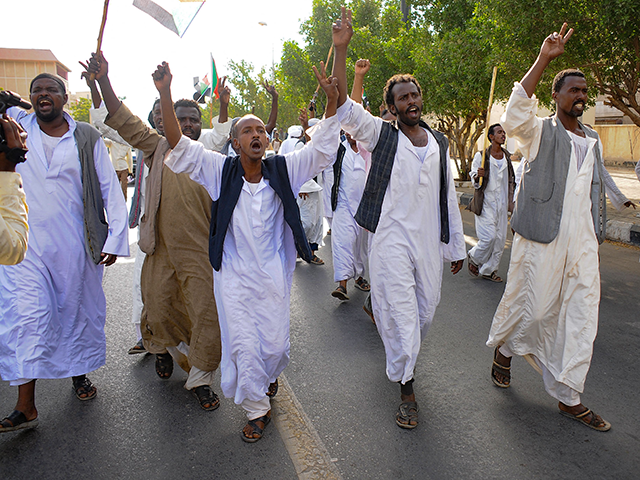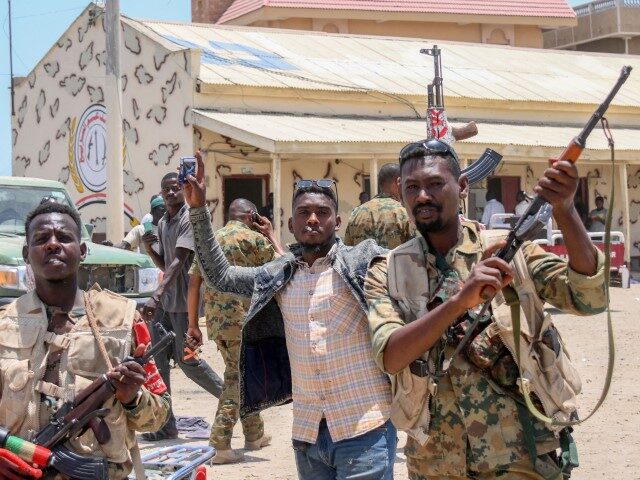The U.S. Treasury Department on Wednesday imposed sanctions for human rights violations against Abdelrahim Hamdan Dagalo, a senior commander in Sudan’s Rapid Support Forces (RSF), a brutal paramilitary force led by Dagalo’s brother Mohammed Hamdan Daglo.
The RSF was part of the junta that overthrew Sudan’s transitional government in 2021, but broke away from the Sudanese army in April 2023, launching a vicious battle for power that has killed and displaced thousands of civilians.
The Treasury Department’s Office of Foreign Assets Control (OFAC) described the RSF as “an entity whose members have engaged in acts of violence and human rights abuses, including the massacre of civilians, ethnic killings, and use of sexual violence.”
“Since the beginning of conflict between the RSF and Sudanese Armed Forces (SAF) on April 15, 2023, both sides have failed to implement a ceasefire, and the RSF and allied militias have been credibly accused of extensive human rights abuses in Darfur and elsewhere,” OFAC said.
The Treasury statement accused the RSF of deliberately targeting women, children, and other civilians for “killing, maiming, torture, or rape” as well as abduction and forced displacement from their homes. The RSF has attacked “schools, hospitals, religious sites,” and other “locations where civilians are seeking refuge.”

A Saudi Navy sailor carries a child as evacuees arrive at King Faisal Navy Base in Jeddah on April 26, 2023, following a rescue operation from Sudan. (AMER HILABI/AFP via Getty Images)
The sanctions deployed by OFAC blocked Abdelrahim’s access to all property and interests in the United States, plus any entity he owns or controls more than 50 percent of.
“In addition, financial institutions and other persons that engage in certain transactions or activities with the sanctioned entities and individuals may expose themselves to sanctions or be subject to an enforcement action,” the Treasury Department warned.
“Today’s action demonstrates Treasury’s commitment to hold accountable those responsible for serious and extensive human rights abuses in Sudan,” said Under Secretary of the Treasury for Terrorism and Financial Intelligence Brian E. Nelson.
“The United States urges both sides of the conflict to cease the hostilities and violence perpetuating Sudan’s dire humanitarian crisis,” Nelson added.
The Treasury statement did not explain why Abdelrahim was individually targeted for sanctions, or why his brother, the nominal leader of the RSF, was not designated. No other individual has been sanctioned by the U.S. for atrocities in Sudan since the junta war began in April.
Secretary of State Antony Blinken condemned the RSF for its atrocities on Wednesday and announced that a second officer would be targeted for sanctions, West Darfur Sector Commander Abdul Rahman Juma.
Blinken said Juma would be sanctioned for the abduction and murder of West Darfur Governor Khamis Abbakar and his brother, a murder committed “just hours after Abbakar’s public statements condemning the actions of the RSF.”
“We will not hesitate to use the tools at our disposal to hinder the ability of the RSF and Sudanese Armed Forces to further prolong this war, and we will also use such tools to deter any actor from undermining the Sudanese people’s aspiration for peace and civilian, democratic rule,” Blinken said.

People cheer a senior general loyal to army chief Abdel Fattah al-Burhan in the Red Sea city of Port Sudan, on April 20, 2023. (AFP via Getty Images)
The killing Blinken referred to was perpetrated on June 14, after Abbakar accused the RSF and its Arab militia allies of committing “genocide” by killing civilians “randomly and in large numbers” during a TV interview.
“We haven’t seen the army leave its base to defend people,” the governor said in the same interview, slamming the other side of the junta power struggle for failing to protect civilians against the RFS’ depredations.
A few hours after giving that interview, Abbakar was abducted from his home by a squad of gunmen. Video posted to social media showed the governor covered with blood from numerous wounds shortly before his death.
Both sides of the junta power struggle blamed each other for Abbakar’s murder, but the United Nations said it had “compelling eyewitness accounts” that pinned the killing on RSF forces. The RSF then tried claiming “outlaws” working covertly for the SAF killed the governor.
Observers both within and beyond Sudan condemned Abbakar’s killing as “barbaric” and correctly predicted it would mark a major escalation in the factional war.
It was also a disturbing sign that ethnic murder was once again fashionable in Sudan, which is haunted by the Darfur genocide of the early 2000s. Abbakar was a member of the Masaleet, an ethnic group that has been systematically targeted for murder ever since the junta war broke out. Prominent Masaleet, including doctors, lawyers, and teachers,” were eliminated with particular vigor to deprive the ethnic group of leadership and political influence.
“There is an emerging pattern of large-scale targeted attacks against civilians based on their ethnic identities, allegedly committed by Arab militias and some armed men in Rapid Support Force uniform,” U.N. envoy Volker Perthes said after Abbakar’s murder.
The Treasury Department had not released a statement detailing sanctions against Juma as of Thursday morning.
Abdelrahim rejected the State Department allegations and Treasury sanctions in an interview with Sky News Arabia on Thursday morning.
“The decision for us is an unfair decision and a decision taken from information from one side or from a side that is very opposite to the Rapid Support Forces,” he said, accusing the U.S. of siding with the SAF in the factional war.
“The authorities that issued the sanctions did not wait and did not know who creates strives in Darfur or who kills people and who defends people’s lives and what strife is happening in Darfur or who solves the problems in Darfur,” he claimed.
Abdelrahim also rejected Wednesday evening’s decree from SAF leader Gen. Abdel Fattah al-Burhan dissolving the RSF, insisting that Burhan did not have the authority to issue such a proclamation, and boasting the militia is well-provisioned to continue fighting for a long time to come.
“We have stores of weapons and supplies belonging to the armed forces… that could last us twenty years,” he said.
U.S. Ambassador to the United Nations Linda Thomas-Greenfield, who delivered the formal announcement of the sanctions against Abdelrahim, quickly responded to his Sky News Arabia interview with derision.
“Please. What is unfair, unconscionable are the atrocities that are being committed against the Sudanese people. That’s the issue that is unfair,” she said. “This is about justice, this is about accountability and that’s where we’re continuing to focus our attention.”
In addition to the sanctions against RSF leaders, the State Department announced $163 million in new funding for humanitarian relief in Sudan, bringing the total U.S. commitment to $710 million.

COMMENTS
Please let us know if you're having issues with commenting.